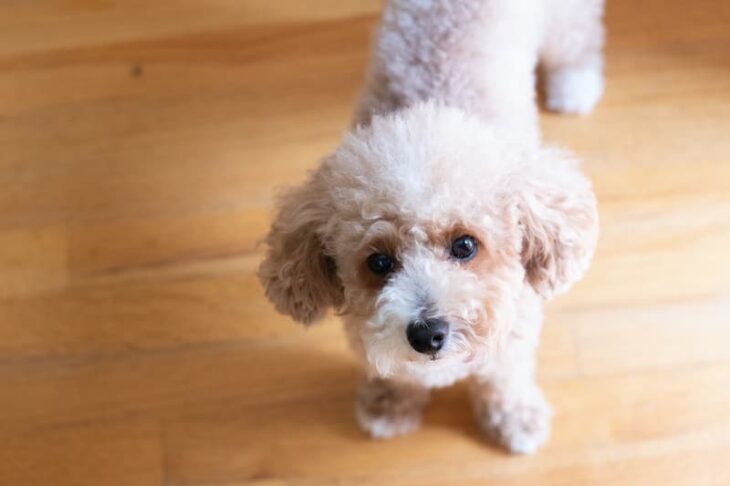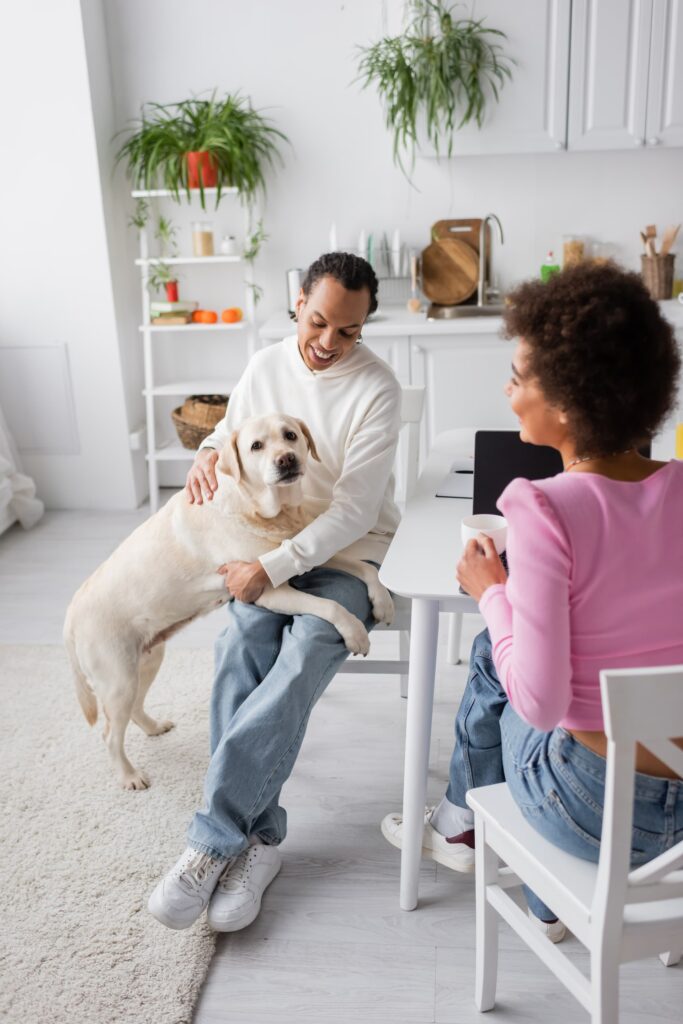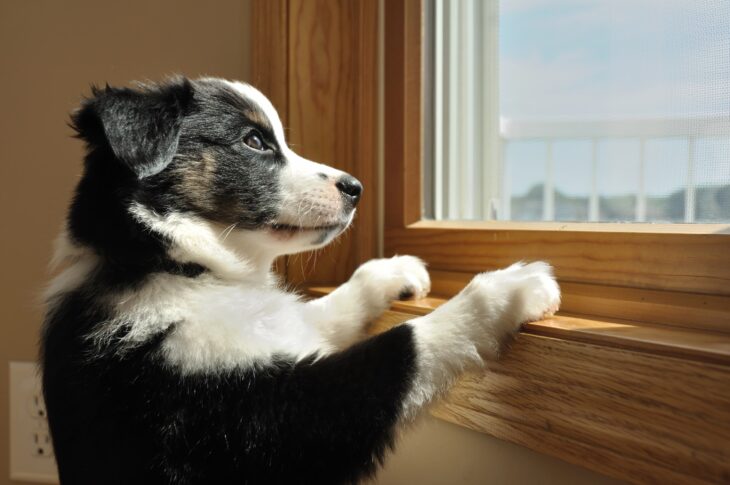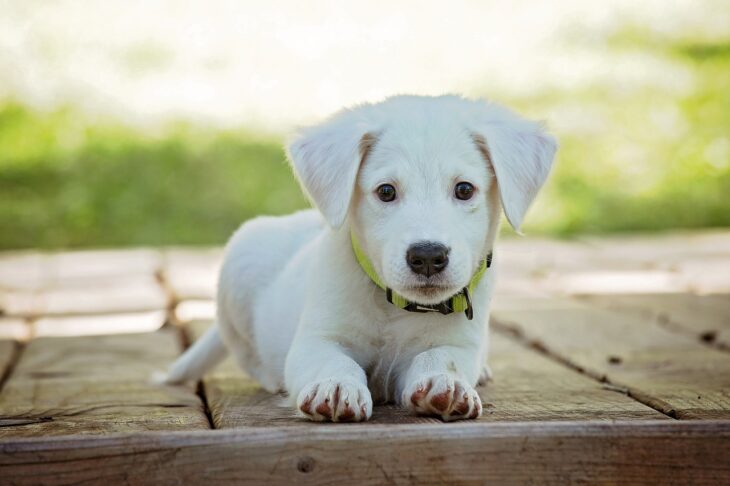Disclosure: Articles may contain affiliate links. As an Amazon Associate, we earn from qualifying purchases (at no additional cost to you). See our full disclosure here.
Last updated on February 10th, 2024 at 03:52 pm
Ever wondered why your furry friend turns into a little fountain of excitement when guests arrive? If you’re here because you need the answer to the question: “Why does my dog pee when excited or greeting someone?” you’re in the right place.
Fear not, pet parents–we’re about to unravel the mystery of those overenthusiastic greetings and what your pup might be trying to tell you. Let’s get into it!

Some dogs don’t just show joy by wagging their tails and jumping into your arms. Some of them, especially toy or small breeds, might also literally pee from happiness when they see you.
So, why is it that if your four-legged friend is housebroken, as soon as you (or a guest) walk through the door, there’s a puddle on the floor? There are a variety of reasons for this all-too-common problem. But, remember, ruling out any health concerns should come first.
If there are no health problems, it’s time to look at other causes, so in this article, we’ll discuss the main reasons why a dog pees from joy or being overly excited.

Their Emotional State
Imagine this: you enter your apartment after a long day at work, and your dog is already on alert. They experience a whole range of emotions, which can sometimes be very difficult to manage: your dog is extremely happy to see you, they may start whining, spinning around, jumping into your arms, and, yes, even peeing from all the excitement.
We certainly should never scold them for this. It’s unfair to discipline them for being happy to see us. The question is: how can we help our four-legged friend keep themselves more in control?
Let’s start with with prevention. If your pet becomes overexcited easily, it’s important to teach them to calm down. Here are a few ideas to try:
- Try coming into the house more calmly. Walk through the door, take off your jacket, and don’t pay attention to your dog…yet. Instead, go about your own activities, and let the dog have a moment to calm down. After their initial excitement subsides, you can talk to and pet your dog–calmly. If you realize that your dog pees specifically as a reaction to your touch and words, then increase the time before you start interacting with them when you get home. This allows your dog time to manage its emotions before you add any more excitement.
- Another tip to try: as soon as you enter the house, give your dog a toy as a distraction. This works even better for dogs whose coping strategy is chewing. This will help your furry family member shift their focus to the toy, helping to release some of that extra energy and those heightened emotions.
- If your dog is normally highly emotional or anxious, you may want to consult a specialist. This may be your veterinarian or an animal psychologist who knows how to deal with these kinds of behaviors. The doctor or psychologist will likely want to analyze the pet’s routine and personality, as well as discussing your family routines as they relate to your pet.
- Be patient as you try each of these tips to see what works best for your pet.
Separation Anxiety
Since we’ve mentioned psychology, let’s talk a little more about what your dog might be thinking. If your pet reacts with extreme emotion every time you return home, they might be experiencing anxiety every time you leave. They might be afraid you’re leaving for a long time, and they don’t want to be alone.
It’s no secret that dogs have an incredibly strong attachment to their owners. It’s important for them that we’re close by, so when we’re not, and then we return, you may just get an intense reaction.
The solution to the problem is to teach your pet that they can stay home alone, and everything will be just fine. They need to understand that you always come back to them, so they don’t need to be afraid or anxious. Yes, this is definitely much easier said than done, but here are some ideas for helping to reduce separation anxiety.
How to know if your dog suffers from separation anxiety:
- First things first–to see what happens while you’re away from home, set up a camera. This can be as simple as leaving your laptop open in the room and watching your dog on Skype, Facetime, or via Facebook Messenger video chat window.
- If you see your dog fall asleep after you leave, that’s great! That means your pet is pretty comfortable at home alone. However, if your dog cannot sleep or get settled, howls, whines, runs in circles, or breathes heavily, that’s a sign they’re having a hard time coping. This tells you it’s time to train (or retrain) them how to stay alone without fear. But how do you do that?
How to reduce separation anxiety:
- Again, we have to think like a dog. It’s crucial that every action we take is as understandable as possible for them. Over time, they come to expect a certain routine and get used to the rituals that are entrenched in everyday life. So, you’ll need to come up with a ritual or routine that will tell your dog that you’re leaving but that you will return soon.
- It is also important to always leave the house calmly, not nervous or panicking yourself about if the dog will be alright. Dogs sense our moods and adopt the feelings and behaviors of their owners. You will want to avoid those long, emotional goodbyes at the doorway.
- Also, be sure that your dog is comfortable at home and not bored while you’re away. Monitor through cameras or a computer to see where the dog prefers to lay or sleep: maybe you need to move its bed to another spot. You might also try leaving something with your scent on your dog’s bed to provide extra comfort. Leave your dog’s favorite items out for a bit of distraction. This could be durable toys, balls, or treats hidden around the room (provided the dog doesn’t get too excited about food). It’s important to find out what calms your pet–you don’t want to cause more stress.
Physiological Issues in Puppies
In puppies up to a year old, especially small breeds, difficulties in bladder control are common. Puddles on the floor can appear not only when they’re excitedly greeting someone at the door, but also during exciting games. This is normal and is not usually anything to worry about. Eventually, everything will settle down: the puppy will grow up and will learn to control itself in these situations.
Remember, if your dog never peed when it was excited before and has suddenly started, it’s time for a health check-up. Once you know that your dog is completely healthy physically, you can try the tips we’ve mentioned or consult an animal psychologist who can help you get a better understanding your your dog and its needs.
Is this an issue you’ve experienced with your dog? If you have tips for your fellow pet parents on how to help a dog who pees when excited or when greeting people, please share your comments below.
Also read:
How to Help Your Dog Overcome Anxiety at the Groomers: 7 Tips
Puppy and Dog Socialization Checklist: 7 Helpful Tips
5 Fun Boredom Busters for Dogs the Whole Family Will Enjoy
Find MomsWhoSave on Pinterest, Facebook, Instagram, and Twitter, and get our updates!
Don’t miss a thing! Subscribe to MomsWhoSave’s newsletter.


Leave a Reply